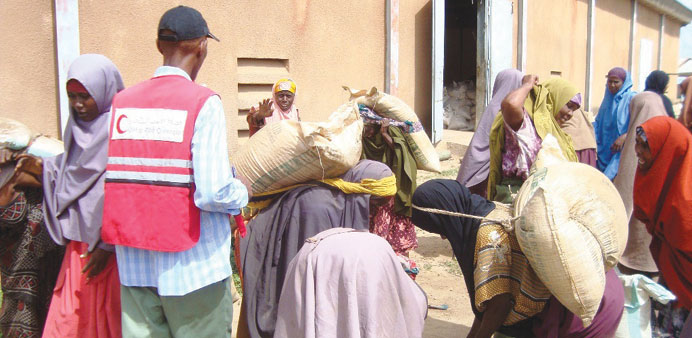The Qatar Red Crescent (QRC) has provided aid worth more than QR10mn in Somalia over three years for relief and developmental endeavours intended to save victims of drought and improve their quality of life.
“The QRC has helped save the lives of more than 298,000 people in the poverty- and disorder-struck nation,” the agency said in a statement.
The QRC has considerable experience as a humanitarian aid provider in Niger, Darfur, and other African disaster and conflict areas.
“As thousands faced the risk of starvation due to a severe drought in 2011, with alarmingly deteriorating humanitarian conditions and a wave of mass internal migration in search of food, QRC was among the first international organisations to respond, by launching several urgent relief programmes to provide basic needs, particularly food, healthcare, and sheltering, with more focus on the most affected southern provinces,” the agency recalled.
In the beginning, the top priority was to distribute food and non-food items, and sheltering assistance. This was done in two phases, benefiting 127,855 people (25,571 families) across southern and central Somalia as well as the capital Mogadishu.
Costing QR4,561,667, these distributions effectively helped cover the basic needs of families amid unfavourable circumstances in camps and food scarcity.
A total of 13,571 one-month food rations were distributed among 67,855 people (13,571 families). At a cost of QR1,012,952, QRC provided 60,000 people (12,000 families) with different requirements of everyday life, such as rain and mosquito protection plastic covers, blankets, straw mats, mosquito nets, cooking utensils, and large-sized water containers ― with special attention paid to schoolchildren-majority families.
To deal with the poor state of health among displaced Somalis, some of who walked hundreds of kilometres to Mogadishu and provincial urban centres in the wake of the crisis, QRC carried out 16 health and food therapeutic projects worth QR3,589,960 to serve 132,500 people (20,500 families), including nine mobile emergency clinics, three healthcare centres, and four food therapeutic centres.
In terms of water and sanitation, QRC transported water from sources more than 100km away to camps and established water reservoirs and sanitary/garbage facilities. These efforts served 67,875 beneficiaries (13,575 families) at a value of QR1,121,327 and had a positive impact on environmental safety and water pollution control in camps, which largely reduced infection and disease
incidence rates, QRC added.

